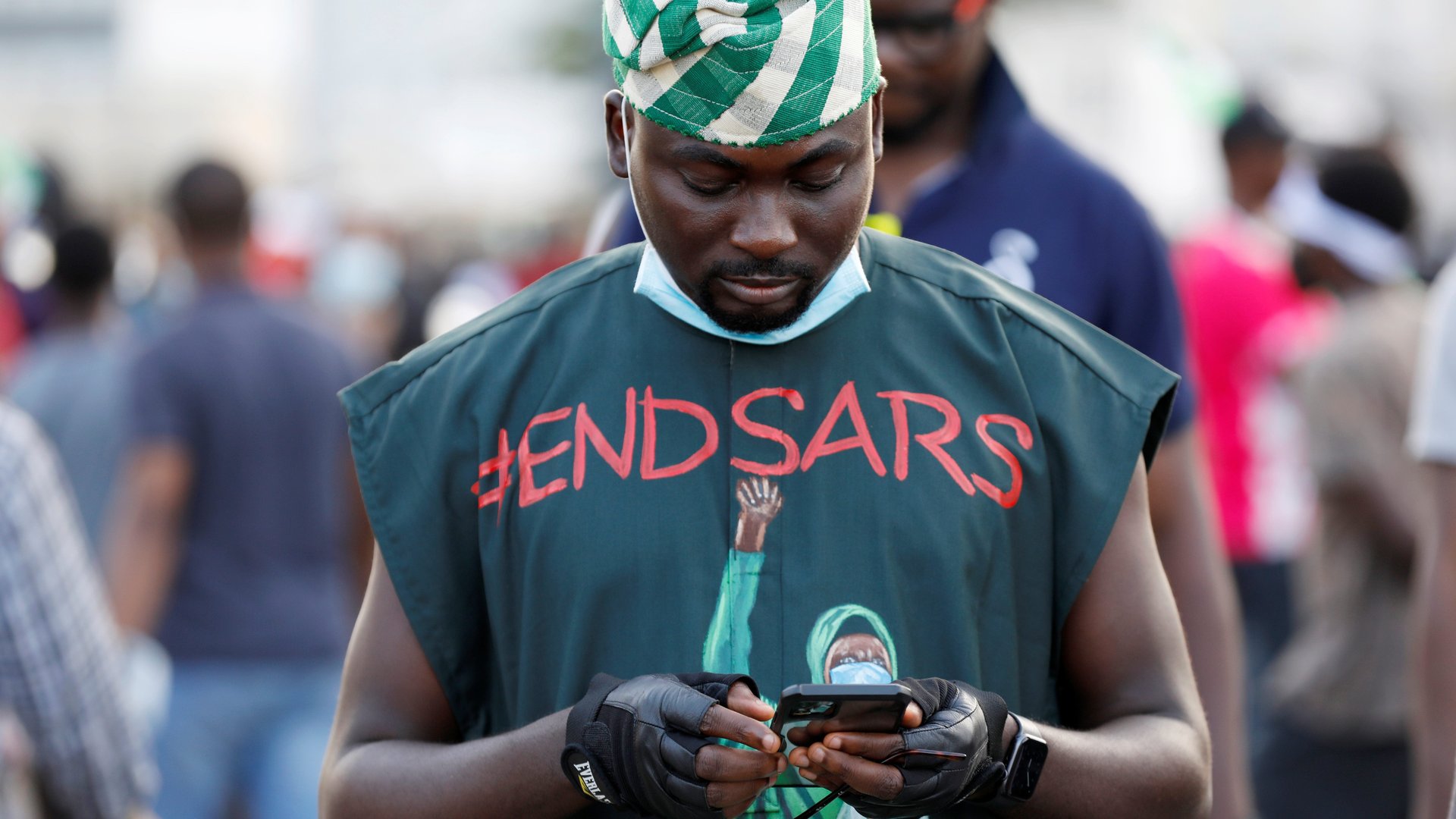Facebook and Instagram made missteps on Nigeria’s EndSARS protest while Twitter boosted it
The two and a half week-long #EndSARS protests in Nigeria against police brutality has garnered attention and raised awareness far beyond the country’s borders thanks to a savvy, well-planned out campaign boosted by Nigerian and global celebrities. But none of this would have been possible without the sheer reach and immediacy of major social media platforms.


The two and a half week-long #EndSARS protests in Nigeria against police brutality has garnered attention and raised awareness far beyond the country’s borders thanks to a savvy, well-planned out campaign boosted by Nigerian and global celebrities. But none of this would have been possible without the sheer reach and immediacy of major social media platforms.
The peaceful protest started online using the #EndSars hashtag before spreading quickly to thousands of people joining protests on the streets of Nigeria’s big cities and then London, Toronto, Houston, and elsewhere, again thanks to social media.
But all social media is not created equal.
The campaign to shut down the controversial and brutal Special Anti-Robbery Squad (SARS) thrived on Twitter in particular and a series of significant #EndSARS hashtags trended globally with millions of retweets. Even Twitter’s enigmatic founder Jack Dorsey joined young Nigerians in encouraging the global Twitter community to donate to the protest organizers using bitcoin.
Twitter gave the EndSARS hashtag an official emoji and verified the Twitter accounts of several users at the forefront of the protest. This act of support contributed to the global credibility of the protest and boosted the movement both online and offline.
But even as the hashtag picked up steam and was shared by the likes of Kanye West and Rihanna, over on Facebook and Instagram some of the posts with the #EndSARS hashtag were being incorrectly labeled as “fake news.”
To make things worse, these “fake news” labels by Facebook and Instagram inadvertently helped to promote a self-serving, anti-fake news campaign by the Nigerian Army, which had come under intense scrutiny after men in military uniforms opened fire on unarmed, peaceful protestors at the Lekki Toll Gate in Lagos on Tuesday (Oct. 20). The Nigerian Army has claimed its soldiers were not involved in what some have labeled a “massacre” despite plenty of video evidence. Many Nigerians now perceive its announcements as government propaganda to discredit the #EndSARS protest.
The Nigerian Army had, during the EndSARS protests, launched “Operation Crocodile Smile” which it described as cyber warfare to help identify and counter fake news against the Nigerian government. When the Army was accused of shooting at protesters at the Lekki toll gate in Lagos three days ago, it labeled social media and news media reports as fake news.
Instagram and Facebook platforms, which are both owned by Facebook Inc, both flagged posts containing words such as “#EndSARS” and “Pray for Nigeria” and of photos of a blood-stained Nigerian flag and a burning candle as fake news, and users were directed to an unrelated fact check article for explanations.
“It seems clear the social media platform’s algorithms are completely falling to differentiate between genuine posts and fake news, causing harm to users and serving as evidence that those algorithms simply are not up to the job of fact-checking when large scale breaking news event occurs,” explained Ray Walsh, a digital privacy analyst at ProPrivacy based in the UK.
Of course, things are never completely straightforward. There have been dozens of supposedly pro-EndSARS posts and photos of dead bodies or wounded people shared on Twitter, Facebook, Instagram, and WhatsApp (also owned by Facebook) which have been flagged as false or misleading by the protest organizers themselves in a bid to avoid the movement’s credibility being tarnished. The open nature of social media means it is difficult to control or manage the sources of information whether it is legitimate or otherwise.
“Instagram and Facebook must make every effort to ensure that genuine posts containing important information about the government’s actions are not being unfairly flagged as fake news,” says Walsh.
Instagram’s public relations team has since released a statement of apology on Twitter admitting it incorrectly flagged content supporting #EndSARS and marking them as false. It says the issue has now been resolved, but supporters of the protest have slammed Facebook for actively helping the Nigerian government refute allegations about the shooting.
It’s just the latest example of the challenge social media’s executives face in how to make decisions when it comes to preventing the spread of misleading information. Facebook’s founder Mark Zuckerberg, in particular, is under scrutiny and pressure in the run-up to the US elections on Nov. 3. Twitter has run into major controversy in the US by attempting to block users from sharing a news story which it claimed was misleading and it has taken to labeling tweets with fact-check tags.
In Nigeria, Dorsey has even been accusing of inciting violence by actively supporting the funding of the mostly peaceful #EndSARS protests. Adamu Garba, a former presidential candidate tweeted he has charged Dorsey to a Nigerian court and he is demanding a compensation of $1 billion to be paid to the Nigerian government for the loss of lives, properties and convenience during the EndSARS protest. Garba, a controversial Twitter user is also demanding that a court order is given to stop Twitter from operating in Nigeria.
Sign up to the Quartz Africa Weekly Brief here for news and analysis on African business, tech, and innovation in your inbox